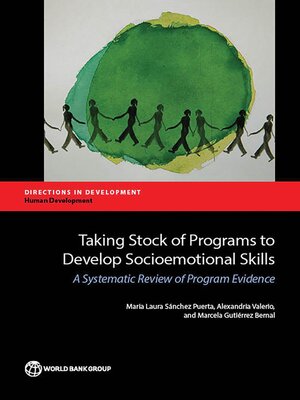Taking Stock of Programs to Develop Socioemotional Skills
ebook ∣ A Systematic Review of Program Evidence · Directions in Development--Human Development
By Maria Laura Sánchez Puerta

Sign up to save your library
With an OverDrive account, you can save your favorite libraries for at-a-glance information about availability. Find out more about OverDrive accounts.
Find this title in Libby, the library reading app by OverDrive.



Search for a digital library with this title
Title found at these libraries:
| Library Name | Distance |
|---|---|
| Loading... |
This book represents a systematic review of the documented impacts of programs aimed at fostering socio-emotional skills in developed and developing countries. It uses a life-cycle approach to organize the findings from rigorous evaluations of more than 80 programs. This includes programs for toddlers and young children before primary school, programs for students enrolled in formal education, and programs targeted at the out-of-school population. The book develops a conceptual framework that helps to identify the program characteristics and participants' profiles associated with a range of program outcomes. These include health-related, behavioral, academic or cognitive, and economic-related outcomes. The review finds that few of the programs studied focus exclusively on the development of socio-emotional skills. In fact, most efforts to develop socio-emotional skills are embedded within innovative education and training curricula, as well as pedagogical and classroom practices. Evidence shows that programs are particularly effective when targeted to highly vulnerable populations and, in particular, to young children. Overall, findings indicate that high-quality programs for young children tend to foster cognitive abilities in the short run and to impact socio-emotional skills over the long run. Programs for students enrolled in formal education (primary and secondary levels) show positive and significant impacts on the outcomes reviewed. The most successful of these programs are implemented school-wide and follow the SAFE approach: that is, they are appropriately sequenced, active, focused, and explicit. Finally, the review finds that programs for out-of-school children and youth are usually designed as a means of achieving immediate labor market outcomes (e.g., job-placement, formal employment, and higher wages). While some of these programs show positive and statistically significant impacts on socio-emotional skills, the impacts tend to be small.







